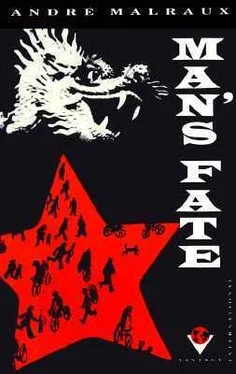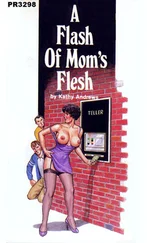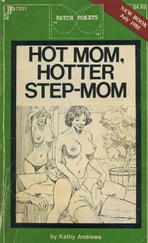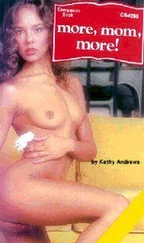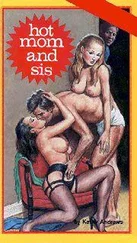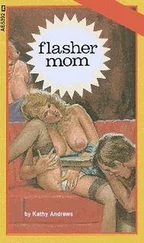“The document?” asked the man at the cargo-port.
Katov presented it. The man passed it on, remained at his post, revolver in hand. This meant that the captain would have to recognize his own document; it was probable that he would, since he had done so when Clappique had presented it. Stil. Below the cargo-port the dark launch rose and fell.
The messenger returned: “You may come up.” Katov did not move; one of his men, who wore lieutenant’s stripes (the only one who spoke English), left the launch, went up and followed the sailor acting as messenger, who led him to the captain.
The latter, a crop-haired Norwegian with blotched cheeks, was waiting for him in his cabin, behind his desk. The messenger went out.
“We’ve come to take delivery of the arms,” said the lieutenant in English.
The captain looked at him without answering, stupefied. The generals had always paid for the arms; up to the time Tang Yen Ta, the go-between, had been sent, the sales had been negotiated secretly by the attache of the consulate. If the generals no longer kept their agreements with the clandestine importers, who would supply them? But, since he had to deal only with the Shanghai government, he could try to save his firearms.
“Well! Here is the key.”
He fumbled in the inside pocket of his coat, calmly, then with a quick move pulled out his revolver-at a level with the lieutenant’s chest, from whom he was separated only by the table. At the same moment, he heard behind him: “Hands up!” Katov, through the porthole opening on the upper deck, had him covered. The captain was now completely bewildered, for this fellow was a white man: but for the moment it was no use insisting. The cases of arms were not worth his life. “A trip to be checked up to profit and loss.” He would see what he could attempt with his crew. He put down his revolver, which the lieutenant seized.
Katov entered and searched him: he had no other weapon.
“Abs’lutely no use having so many revolvers on board and only carrying one on you,” he said in English. Six of his men entered behind him, one by one, in silence. Katov’s heavy gait, robust air, upturned nose, his light
blond hair were those of a Russian. Scotch? But that accent.
“You’re not from the government, are you?”
“Mind y’r business.”
The second officer was being brought in, duly tied hand and foot, caught in his sleep. The men bound the captain. Two of them stayed to guard him. The others went below with Katov. The men of the crew belonging to the Party showed them where the arms were hidden; the sole precaution of the Macao importers had been to write “Unmounted Pieces” on the cases. The unloading began. The gangway having been lowered, this was easy, for the cases were small. When the last case was in the launch, Katov went out and destroyed the wireless apparatus, then went back into the captain’s cabin.
“If you’re in too much of a hurry to land I warn you you’ll be abs’lutely shot down at the first turn of the street. Good evening.”
Sheer bravado, but the ropes digging into the arms of the prisoners gave it some force.
The revolutionaries, accompanied by the two men of the crew who had guided them, returned to the launch: it fell away from the gangway and sped straight towards the wharf. Tossed about by the swell the men, triumphant but anxious, changed costumes: until they reached shore, nothing was certain.
There a stake truck was waiting for them, Kyo sitting beside the driver.
“Well?”
“Nothing. An affair for b’ginners.”
The cases were transferred, and the truck drove off, carrying Kyo, Katov and four men, one of whom had kept his uniform. The others dispersed.
It rolled through the streets of the Chinese city with a rumble that was drowned at each b^p by a rattle of tin: the stakes were lined with gasoline cans. They stopped at every important ch'on: shop, cellar, apartment. A case was taken down; stuck on the side, a ciphered note made by Kyo indicated the distribution of the arms, some of which were to be passed on to the secondary combat organizations. The truck would stop barely five minutes at each post for it had to call at more than twenty posts.
They had only treason to fear: the noisy truck, driven by a man in gove^rnmental uniform, aroused no suspicion. They met a patrol. “I’ve become the milk-man making his round,” thought Kyo.
Day was dawning.
Eleven o'clock in the morning
THINGS are going badly,” thought Ferral.
His car-the only Voisin in Shanghai, for the President of the French Chamber of Commerce could not use an American model-was speeding along the quay. To the right, under the vertical banners covered with characters: “A twelve-hour working day,” “No more employment of children under eight,” thousands of spinning- mill workers were standing, squatting, lying on the sidewalk in tense disorder. The car passed a group of women who were rallied round a banner-1 “Rigbt to sit down for women-workers.” The arsenal itself was empty: the metal workers were on strike. To the left, thousands of sailors in blue rags, without banners, crouched along the stream, waiting. On the quay-side, the crowd of demonstrators filled the side-streets as far as the eye could reach; on the river-side they clung to the landing-stages, concealing the edge of the water.
The car left the quay, swung into the Avenue of the Two Republics. And now it could advance only with difficulty, caught in the seething movement of the Chinese crowd which was bursting from all the streets towards the refuge of the French concession. As one racehorse outdistances another, head, neck, shoulders, the crowd was “closing in” on the car, slowly, steadily. Wheelbarrows with babies’ heads sticking out between bowls, Peking carts, rickshaws, small hairy horses, handcarts, uucks loaded with sixty-odd people, monstrous mattresses piled with a whole household of furniture, bristling with table-legs, giants with cages of blackbirds dangling from the end of their anns which were stretched out to protect tiny women with a litter of children on their backs. The chauffeur was at last able to tum, to get into streets that were still obsuucted but where the din of the hom sent the crowd scurrying a few meters ahead of the car. It arrived at the vast headquarters of the French police.
Ferral climbed the stairs almost at a run.
In spite of his slicked-back hair, his informal tweed suit, and his gray silk shirt, his face preserved something of 1900, of his youth. He smiled at people “who disguise themselves as captains of industry,” which permitted him to disguise himself as a diplomat: he had relinquished only the monocle. His drooping, almost gray mustache, which seemed to prolong the sagging line of his mouth, gave his profile an expression of refined brutality; its strength was in the combination of his aquiline nose and his jutting chin, badly shaved this morning: the water- service employees were on strike, and the limy water brought by the coolies gave the soap a poor lather. He disappeared in the midst of the bows that greeted him.
At the far end of the office of Martial, the chief of police, a Chinese secret agent-a paternal-looking Her- cules-was asking:
“Is that all, Chief?”
“Also, getbusy disorganizing the syndicates,” answered Martial, whose back was turned. “And what’s more, you’ll have to snap into it. The work’s been rotten. You deserve to be fired: half your men can't be trusted out of sight! I’m not paying you to hire quarter-revolutionaries who don’t dare to come out in the open and say what they are: the police is not a factory for fu^rnishing alibis. Fire all agents who traffic with the Kuomintang, and don’t let me have to tell you again. And try to understand, instead of looking at me like an idiot! A nice mess it would be if I didn’t know my men better than you know yours!”
Читать дальше
